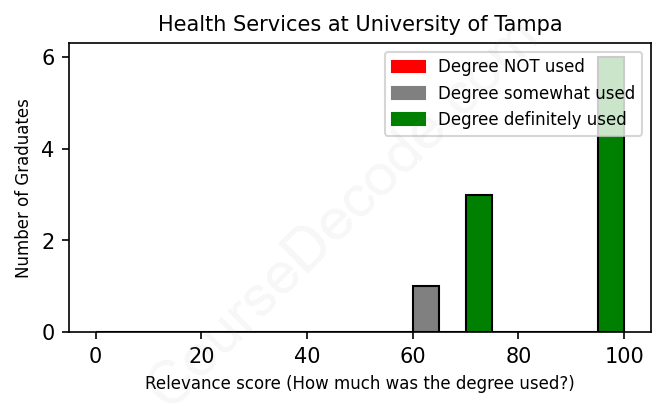
First, some facts. Of the Health Services graduates from University of Tampa we've analyzed , here's how many have used (or NOT used) their degree in their career:

These are estimates based on AI analysis of 10 LinkedIn profiles (see below).
The verdict? Significantly above average. Overall, with an average relevance score of 87%, Health Services graduates from University of Tampa have a much higher likelihood (+20%) of finding work in this field compared to the average graduate across all fields:
And for comparison, here's the chart for all profiles we've looked at across all degrees.
Also, after graduating, 60% of these graduates have pursued further education other than another Bachelor's degree (such as a Masters degree or other), compared to the average across all profiles of 35%. This suggests you may need more than just a Bachelors degree to be competitive as a Health Services graduate.
See the details:
|
Relevance score: 100% We think this person has gone into a career highly relevant to their degree. We think this person has gone into a career highly relevant to their degree.
DEGREE INFOGraduated in 2017 from University of Tampa with a Bachelors Degree in Health Services. Also pursued further education since (see below). JOB HISTORY SINCE GRADUATIONMedical Assistant St. Clair Shores OB/GYN Jun 2017 - Nov 2018 Physician Assistant Certified  The Breast Place Nov 2020 - Present FURTHER DEGREES DONE SINCE GRADUATINGMaster of Medical ScienceCharleston Southern University 2019 - 2020 ABOUTNo information provided. |
The top 10 most common jobs done by the graduates we've analyzed (ranked most common to least) are:
From analyzing the LinkedIn profiles of graduates with a Health Services degree from the University of Tampa, it's clear that many of them have taken up roles that are quite relevant to the field. Some of the most common job titles include Medical Assistants, Physical Therapists, and various roles within healthcare facilities such as hospitals and clinics. The trends show that a lot of graduates have secured positions that require significant clinical knowledge and hands-on experience in patient care, which aligns perfectly with their educational background. For example, jobs as Medical Assistants and even advanced roles like Physician Assistant Certified indicate a strong application of the skills learned in their degree programs.
However, there are also instances where the relevance to Health Services is a bit shaky. Positions like Administrative Specialist at an accounting firm or Training Manager that doesn’t directly involve patient care show that not every path taken by these graduates strictly adheres to the core competencies of their degree. While some have moved into training roles or jobs in education and management that may touch on health topics, they don’t necessarily utilize the healthcare-specific training they received. Overall, the majority of the jobs are meaningfully related to health services, but there is also a mix of roles that might not fully harness their degree’s potential.
Here is a visual representation of the most common words in job titles for Health Services graduates (this is across all Health Services graduates we've analyzed, not just those who went to University of Tampa):

Looking at this list of career paths taken by graduates from the University of Tampa with a degree in Health Services, it seems like they generally kick off their careers in entry-level health-related positions. For many of them, their first jobs right after graduation involve roles like medical assistants, EMTs, or various supportive roles in healthcare settings. This makes sense, as these jobs provide a solid foundation and an entry point into the healthcare industry. Even those who had internships during their studies often transitioned into relevant positions in physical therapy, medical assistance, or administrative roles in health services, reflecting a clear alignment with their academic background.
As time goes on, many graduates appear to advance in their careers, often taking on more responsibilities or moving into specialized roles within healthcare. A few have progressed to higher positions like clinic directors or training managers, which showcases the potential for career growth within the industry. For example, those who started as medical assistants have moved on to become nurse externs or physician assistants. On the other hand, a handful have veered off into roles that seem less directly related to health services, like administrative positions. Overall, it looks like a majority of graduates from the Health Services program are finding good opportunities in relevant fields, and many seem to be building promising careers in healthcare over the years following their graduation.
Hey there! So, a Bachelor’s degree in Health Services, whether at the University of Tampa or somewhere else, is generally considered to be on the easier side compared to some other majors, but that doesn’t mean it’s a walk in the park. You’ll have to juggle some core classes in health policy, management, and maybe even a little bit of anatomy and physiology, which can get tricky. Still, a lot of it revolves around learning concepts and theories more than intense math or science, so if you put in the effort and stay organized, you should do just fine! Overall, I’d say it’s manageable, but like any degree, it does require dedication.
Most commonly, in the LinkedIn profiles we've looked at, it takes people 4 years to finish a Bachelor degree in Health Services.
Looking at this lineup of University of Tampa health services grads, it seems like most of them are on a pretty decent career path, though their earnings likely vary quite a bit. Folks like the Senior Admissions Representative who moved up to Training Manager, and the Physical Therapist who became a Clinic Director, probably pulled in some solid salaries over time—maybe into the mid to high 60s or even more. However, some of the earlier roles like Medical Assistant or COVID-19 hotline rep might be on the lower end, probably in the 30s to 40s range. It’s a mixed bag, with a few doing really well and some just starting out. Overall, though, they seem to be gaining valuable experience and taking steps towards higher paying roles, which is a good strategy!
Here is a visual representation of the most common words seen in the "about" section of LinkedIn profiles who have a Bachelor degree in Health Services (this is across all Health Services graduates we've analyzed, not just those who went to University of Tampa). This may or may not be useful:

Here are all colleges offering a Bachelor degree in Health Services (ordered by the average relevance score of their Health Services graduates, best to worst) where we have analyzed at least 10 of their graduates:
| College | Score | Count |
|---|---|---|
 The Ohio State University The Ohio State University
|
88 | 14 |
 Quinnipiac University Quinnipiac University
|
88 | 10 |
 Grand Valley State University Grand Valley State University
|
87 | 16 |
 University of Tampa University of Tampa
|
87 | 10 |
 Stony Brook University Stony Brook University
|
80 | 15 |
 Boston University Boston University
|
79 | 12 |
 University of Connecticut University of Connecticut
|
78 | 26 |
 Florida Agricultural and Mechanical University Florida Agricultural and Mechanical University
|
76 | 12 |
 Texas A&M University Texas A&M University
|
72 | 16 |
 University of South Florida University of South Florida
|
72 | 26 |
 Boise State University Boise State University
|
71 | 11 |
 University of Central Florida University of Central Florida
|
68 | 47 |
 Florida Gulf Coast University Florida Gulf Coast University
|
68 | 10 |
 James Madison University James Madison University
|
66 | 26 |
 University of Missouri-Columbia University of Missouri-Columbia
|
66 | 17 |
 California State University, Fullerton California State University, Fullerton
|
66 | 13 |
 California State University - East Bay California State University - East Bay
|
66 | 10 |
 Arizona State University Arizona State University
|
62 | 10 |
 Cleveland State University Cleveland State University
|
60 | 10 |
 Stockton University Stockton University
|
58 | 12 |